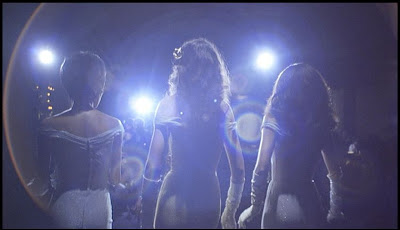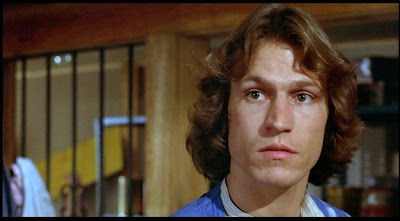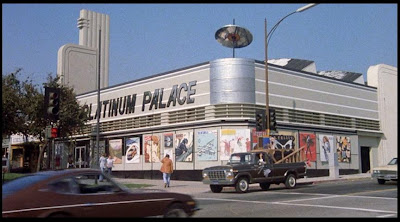Perhaps it's because I'm too old to know precisely what a Jordin
Sparks is (it's not, as initially presumed, a small town in Virginia, but a
recording artist). Still, I had no idea there was to be a remake of this
cult-worthy 1976 Irene Cara film (slated to star said Ms. Sparks) until I began to do
a little Internet research for this post.
Maybe this is a harbinger of some kind of covert Hollywood covenant
to redo the entire Irene Cara oeuvre (we've already had a reboot of The Electric Company and a limp remake
of Fame). If so, I'm going to seriously lose
it if somebody announces a remake of 1985s Certain
Fury—itself a kind of a gender-flip remake of Sidney Poitier's The Defiant Ones—which featured Oscar winners Tatum
O'Neal and Irene Cara as a pair of mismatched ex-cons handcuffed to one another.
(I kid you not.)
So now there's to be a remake of Sparkle…
If Hollywood is so concerned about piracy, you'd think they
might first start "in-house" and set an example by ceasing this endless
plundering of their own past successes and begin to cultivate a little
originality. But I digress.
Sparkle. The place
and time is Harlem/1958. The girl-group plotline evokes The Supremes and all
they represent as conflicting symbols of aspirational Black success and crossover assimilation. The small-time show-biz milieu of Harlem jazz clubs and the
seedy R&B/soul circuit pay homage to the Black roots of rock
& roll while the music prefigures the emergent voices of inner-city youth and
the beginnings of the Civil Rights Movement.
 |
| Irene Cara as Sparkle Williams |
 |
| Lonette McKee as Sister Williams |
 |
| Dwan Smith as Dolores Williams |
 |
| Philip Michael Thomas as Stix Warren |
 |
| Dorian Harewood as Levi Brown |
Sparkle is a '50s girl group take on the oft-told show-biz saga of gifted performers from humble
beginnings who discover, only too late, that the road to fame is paved with
heartbreak, disillusion, and tragedy.
"I want the big time!" conveniently asserts beautiful,
self-assured, and headed-for-certain-trouble Sister Williams (Lonette McKee), one-third of the gospel-singing Williams sisters, consisting of woke, budding Black-Power radical, Delores Williams (Dwan Smith); and sweet-natured,
self-effacing Sparkle Williams (Irene Cara)…i.e., the obvious heroine of the
film.
With the help of neighborhood pals Stix (Philip Michael
Thomas), a dreamer who longs to write songs, and Levi (Dorian Harewood), always
on the hustle, this trio of starry-eyed schoolgirls dubs themselves "Sister
& the Sisters" and become regional nightclub overnight sensations.
But of course, since Sparkle is both a cautionary tale on the price of fame and a morality play on the importance
of integrity, things go wrong in a big hurry. Cue in the drug abuse, dashed
hopes, romance troubles, death, racketeering, and familial discord. Will Stix ever
realize his dreams of becoming a songwriter? Will the tragedies visited upon
Sparkle instill a newfound maturity in her singing? Is talent alone enough to lift a bunch of hopeful but naive teens out of the ghetto?
If you don't know
the answers to these questions, you've likely never seen a rags-to-riches show-biz movie before.
 |
| Soul Sisters |
Those looking to Sparkle
for gritty, '70s-type urban realism will have to look elsewhere. Although
released in the same year as Taxi Driver,
Sparkle is more of a direct
descendant of those old Judy Garland/Mickey Rooney "Let's put on a show!"
musicals, crossed with the inner-city slum dramas Warner Bros. specialized in
during the '30s. Like Rocky, another
film released in 1976, Sparkle is
really just an updated old movie.
In fact, Sparkle's melodramatic yet ultimately uplifting plotline and its virtually all-Black cast most closely resemble the heyday of the "Race Film." Race Films were independent motion pictures made between 1915 and 1950, created exclusively for and often by Black filmmakers. During the era of segregation, these films, popular in Black neighborhoods across the country, featured all-Black casts and were the first movies to portray African Americans in heroic lead roles central to the plot.
Sparkle's backlot
depiction of Harlem, populated with characters going by the names "Stix," "Satin," and "Tune-Ann," harken back
to The Harlem Tuff Kids (Black cinema's answer to The Bowery Boys), a pack of
late 1930s comic delinquents with names like "Icky," "Stinky," and "Shadow."
 |
Brownstone Socializing: (l. to r.) Levi, Dolores, Sister, Stix, & Sparkle
I wonder if the online commenters criticizing the so-called silly names of Sparkle's characters have the
same problem with Grease's "Putzie," "Doody," & "Frenchy"; or Laverne & Shirley's "Squiggy"? |
The '70s were certainly boom years for Blacks in
film, but by 1976, I personally had grown weary of the decade's pimp & prostitute /Kung
Fu-Badass Blaxploitation overkill. The fascination all those sassy Black female
crime-fighters and morally dubious Super-Flys held for the white suburban male
teens who filled the local theaters where these films played (was Quentin
Tarantino among them?) was lost on me. Nor was I much fonder of the parade of Noble Slave dramas or other parades of Black suffering that seemed to represent the only other alternative view of Black life Hollywood seemed interested in exploring.
With '70s America deep in the throes of a nostalgia craze that romanticized the past as a simpler, gentler time (tellingly, devoid of people of
color):
The Summer of '42,
The Last Picture Show,
American Graffiti,
The Way We Were—the arrival of
Sparkle
on the scene felt like a small kind of miracle and a very welcome change of pace. The screenplay's approach to the material may have been a
tad trite, the direction amateurish and ill-serving of its young cast, but
Sparkle gave Black kids (the
film was rated PG) a nostalgic taste of their own history for a change. It's not a perfect
film, but even with the clichés stacked higher and higher with each scene, I find something irresistibly likable and naively charming about
Sparkle.
 |
| Sparkle is at its best when it stops propelling its predictable plot forward and pauses long enough to provide keen-eyed details of African-American life in the late '50s. Growing up in a household with four sisters, I recall very well the Sunday evening kitchen ritual of hair straightening with a hot comb straight off the burner. |
WHAT I LOVE ABOUT
THIS FILM
As a fan of musicals, Sparkle's primary appeal for me has always been Curtis Mayfield's catchy musical score and the sleek, '60s girl-group choreography of Lester Wilson. Mayfield's songs are pop/funk, '70s-style
riffs on the early R&B/Soul sound of Motown, while Wilson's choreography captures
the stylized, often witty, gesture/posing dance style that became an identifying
staple of girl-group performances for years.
The songs, as sung by the film's cast, are all so well-performed that there was an outcry from fans when the soundtrack
album for Sparkle was released, with
Aretha Franklin taking over the vocals exclusively. Although I've read conflicting
accounts over the years as to the whys of this decision, and while I personally prefer
the film's cast interpretation of the songs, one has to imagine that, to the
studio, the financial prospects of an Aretha Franklin album must have appeared
a great deal more lucrative than that of a soundtrack album to a modest film
with no stars in its cast.
 |
Choreographer Charles "Cholly" Atkins
Exclusive Motown choreographer whose routines for musical acts like The Supremes and The Temptations were the inspiration for Lester Wilson's work in Sparkle |
PERFORMANCES
Although the delectably fresh-faced Irene Cara emerged the bigger
star in later years as actress, recording artist, and Academy Award-winning songwriter
(for "Flashdance…what a Feeling"), it's Lonette McKee who gives my favorite (and the most narratively grounding) performance in
Sparkle. She is so electrifyingly
good that the temperature of the film drops several degrees for every minute that
she's off-screen. A more intuitive director than Sam O'Steen (editor of
Rosemary's Baby, making his feature film directorial
debut) might have sensed how strongly the prolonged absence of the film's most
dimensional and dynamic character would have on
Sparkle's overall impact.
Indeed, had Lonette McKee been given the opportunity to be the kind of dominant presence in the film that she is in the lives of her sisters, I believe the audience would have mourned her absence alongside the characters on screen much more than they're allowed to. McKee's sad eyes and well-executed tough-girl persona convey a sense of authentic emotional gravitas. Without McKee, Sparkle becomes slightly too light for its own good.
 |
| Mary Alice as Effie Williams |
On the subject of meeting her daughter's new suitor, small-time gangster Satin Struthers (Tony King)-
Effie: "He's just gonna drag
you to the gutter with him."
Sister: "The gutter? How can
you say that? He's as big-time as you can get."
Effie: "I've lived in Harlem
all my life…I know a rat when I see one."
THE STUFF OF FANTASY
In the impressive array of talent (both young and veteran) that
appear in cameo and bit roles, Sparkle
pays homage to pioneer African-American entertainers:
 |
| Veteran comic actor Don Bexley (best known as Bubba on the TV show Sanford & Son) appears in Sparkle as the raunchy emcee for the Simmons Hall amateur contest |
 |
Legendary comic Timmie Rogers as the M.C. of the Shan-Doo Club
where Sisters & The Sisters make their debut.
Back in the days when African-American comics habitually appeared in blackface, spoke in dialect, and wore sloppy clothes; Rogers was the first to appear in a tuxedo, as himself, and daring to speak directly to white audiences (a practice unprecedented in Black comics during the '40s ).
With his emphatic catchphrase, "Oh, yeah!" He was my father's favorite stand-up comedian.
Tony Award-winning choreographer Michael Peters (Dreamgirls) also created the iconic dances for Michael Jackson's Thriller and Beat It music videos. In Sparkle, he appears as an outrageous R&B singer in the style of Screamin' Jay Hawkins |
 |
| The performer shown briefly in Sparkle, portraying a singer in the mode of Ruth Brown and LaVern Baker, is Renn Woods. Woods portrayed Dorothy in the 1976 National Tour of The Wiz and appeared in the films Hair and Xanadu |
THE STUFF OF DREAMS
Sparkle is set in the late '50s, but the film's footing feels too uncertain for me to determine whether its resemblance to an actual movie made in the 1950s is entirely intentional. If I have any complaint about its storytelling structure, it's that Sparkle's plot is so eager to reach its destination that it rushes these interesting and unfamiliar characters along at too rapid a pace.
Nevertheless, the film is a lot of engaging fun in its small, slice-of-life moments. The mother ironing in the living room; the kids having to change out of their "school clothes" when they come home; the ever-present neighbor lady who constantly butts into other people's business; the young men sporting "conk" hairstyles (relaxed-hair pompadours).
 |
Black American Graffiti
As earlier stated, Sparkle is at its best when just showing us glimpses of life in late-'50s Harlem |
All of the above are more compelling than the straight-as-an-arrow course that Sparkle's conventional rags-to-riches storyline races us through (I've seen the film many times and I'm still unclear as to how long the girls get to enjoy their success before things start to go wrong. It feels like a week.) Watching Sparkle - written by Joel Schumacher and Howard Rosenman - I'm left with the feeling that it would be a much better film had the characters and their behavior been allowed to move the plot forward...not the other way around. Too bad. The people populating Sparkle seem like folks I would be interested in getting to know better if only they'd been granted the time to be fleshed out more.
Where Sparkle's footing feels most assured is in its atmospheric depiction of the squalid glamour of the Harlem nightclub scene. These sequences, along with the musical numbers, give the film a moody grit that the screenplay lacks. Cinematographer Bruce Surtees (Night Moves, Lenny) paints Sparkle with a dark, Gordon Willis-like palette of claustrophobic shadows, creating some of the most atmospherically seedy nightclub sequences since Cabaret.
Sparkle is one seriously DARK movie (and I'm not referring to its themes); it's almost unwatchably so on VHS. Now, with HDTV and a digitally remastered DVD, Sparkle looks better than ever. A few years ago, I recall reading somewhere that the low-exposure look resulted from having a cinematographer who was inexperienced in lighting People of Color.
Sparkle was
released in 1976. The same year as
The Omen,
King Kong,
A Star is Born,
Family Plot,
and
Marathon Man; all films with
advertising budgets that probably exceeded
Sparkle's
entire production costs. I stood in lines to see each of the above films,
but I was practically the only person in the San Francisco theater where I
first saw
Sparkle. As a PG-rated, small-scale period musical drama with a Black cast of virtual unknowns and but a few easily-exploitable elements (no kung-fu mamas or jive-talkin' daddies to promote); a film as atypical as
Sparkle was a hard sell in the '70s market.

I have no idea if Sparkle was successful enough to ever show a profit, but I'm glad to know it has become something of a cult classic over the years. Because, flawed as it is, Sparkle is a rarity. Not only in being a female-centric Black film, but the first to dramatize the formation of an R&B girl group, using the formative years of the African-American music scene as a
narrative backdrop. Since no film before this had ever tackled the subject matter, it's
my guess that in some small way Sparkle
went on to inspire the 1981 Broadway musical Dreamgirls.
Although the current track record for remakes is pretty
shabby, I'm going to keep an open mind about the Sparkle remake and wish it well. If nothing else, it's sure to
bring more attention to the original.
ADDENDUM: January 20, 2014
Watched the 2012 remake of
Sparkle on DVD. Because this is a blog devoted to movies I love, perhaps the kindest thing I can say about the remake is that the original is in no danger of being replaced in anyone's memory. Indeed, by comparison, the Sparkle has the 1976 original looking like the
Citizen Kane of Black Cinema.
I genuinely couldn't believe how weak the effort was. I enjoyed seeing Whitney Houston but was dismayed by the fact that, with $17 million and over thirty years of advanced motion picture technology, they couldn't produce a film with even a fraction of the competence of a low-budget feature from the '70s. It was a seriously depressing endeavor on so many fronts.































































